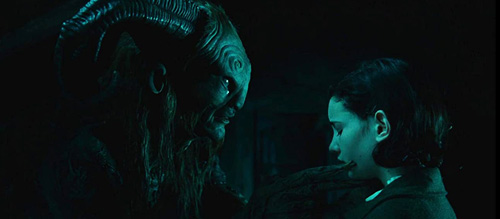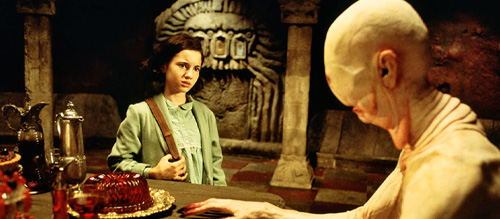‘Pan’s Labyrinth’ at 15 – Review

Pan’s Labyrinth/El laberinto del fauno (2006)
Director: Guillermo del Toro
Screenwriter: Guillermo del Toro
Starring: Ivana Baquero, Ariadna Gil, Sergi López, Maribel Verdú, Doug Jones, Álex Angulo, Manolo Solo
“A long time ago, in the Underground Realm, where there are no lies or pain, there lived a princess who dreamt of the human world”.
Mexican filmmaker Guillermo del Toro has always identified with monsters. Monsters may be otherworldly, strange and outlandish in appearance, but they are inherently sympathetic, unlike people, particularly adults, who should be regarded with caution. 2006’s Academy Award-nominated Pan’s Labyrinth was del Toro’s most acclaimed work right until he finally won an Oscar for The Shape of Water in 2018. Fifteen years on, how does this twisted but beautiful fairy tale hold up?
It’s Spain, 1944, and left-wing guerrilla fighters continue to engage with the military forces of General Franco’s fascist regime. Ten year-old Ofelia (Ivana Baquero) travels with her pregnant mother (Ariadna Gil) to see her stepfather Captain Vidal (Sergi López) who has been tasked with flushing out resistance forces. In the course of exploring the surrounding countryside, Ofelia finds an ancient labyrinth and meets a mysterious Faun (Doug Jones), who informs her she is the long lost princess of the underworld and will need to complete three tasks in order to return.
This is a classic tale of a curious child with an overactive imagination going on a magical journey that may or may not be real, like “Alice in Wonderland” or “Peter Pan”. All of us who were solitary kids who’d happily make up their own stories and adventures to keep entertained on a daily basis can identify.
From the beginning we are told the backstory of the princess in fairy tale form – what changes she has gone through to leave the Underground Realm and why – and the Faun tells Ofelia what she must do in order to return with her powers restored, but we do not know for certain that her and Ofelia are one and the same until the story’s conclusion. Javier Navarrete’s delicate but often brooding score matches this dark bedtime story perfectly, switching from enchanting to ominous as Ofelia makes mistakes in her quest.
Del Toro’s Spanish-language films have shown a preoccupation with his ancestral country’s chequered past and have processed national trauma through Magical Realist storytelling. The Devil’s Backbone literally had a bomb dropping on an orphanage and a restless boy’s soul wandering the corridors, a victim of violence. Pan’s Labyrinth uses escapist fantasy as an outlet for a young girl processing a difficult period of change in her life; a new home, a new stepparent, a sibling on the way.
As lush as the Oscar-winning production design by Euginio Caballero and Pilar Revuelta is, and as powerful a spell the film casts on you, del Toro still puts a lot of weight on his young lead’s shoulders. Thankfully, Ivana Baquero playing Ofelia is more than up to the task, bringing inquisitiveness, fortitude and an ability to process some pretty full-on emotional material far beyond her years.
You’ve always got to have an evil stepparent in a story like this, and Vidal is one of the foulest human villains in the del Toro filmography. He is introduced through his obsession with order via his father’s watch (clockwork mechanisms being a favourite del Toro visual) and soon proves himself to be abusive to Ofelia and her mother, not to mention vindictive and malicious as he kills an innocent farmer with a bottle and mockingly tortures a stuttering prisoner of war. He only becomes more of a monster as the film goes on, as his obsession with hunting down spies within his own ranks and protecting his legacy makes his behaviour more deranged and senselessly violent, and Sergi López’s performance is utterly terrifying because it’s so horribly human.

Pan’s Labyrinth is a real treat for fans of del Toro monsters, pretty much all of them realised through a combination of expressive performance and lovingly crafted makeup and animatronics. His monsters tend to be three-dimensional and complex beings, but there is one wonderful exception: the Pale Man. Portrayed, like the Faun, by del Toro regular collaborator Doug Jones, this eyeless, saggy, shambling zombie is one of the great nightmare monsters in horror, his sequence where he guards the most tempting of forbidden banquets (which Ofelia inevitably partakes in) is rightly seen as a creepy highlight.
The Faun himself is a bit of a sinister presence too, a faded magical creature from European myths and legends pulling strings and manipulating a pre-teen into doing his bidding with the promise of ever-lasting life and happiness. Even the traditional fairy tale stuff isn’t quite what it seems and nobody from the fantasy realm’s true motivation becomes clear until right at the story’s close.
Del Toro never holds back on depicting the senseless violence of warfare, and the scenes involving the military or collateral damage on the ordinary people of Spain are brutally, realistically violent and always kept completely separate from the story’s more fantastical elements. In fact, the fantasy scenes are usually seen entirely from Ofelia’s perspective, leaving some doubt over whether any of it is really happening outside her imagination-as-coping-mechanism, as her mother sadly states “Magic doesn’t exist, not for you, me or anyone else!”. Considering del Toro’s penchant for fantasy storytelling you might think he’d want to blend the elements a little more, though he must have always had in the back of his mind thoughts of inadvertently trivialising Spain’s traumatic wartime experiences.
Pan’s Labyrinth has barely aged a day and remains a classic fantasy/war film hybrid, and a deeply personal piece of artistic expression for Guillermo del Toro. The film was unlucky enough to come up against Lives of Others in the Best Foreign Language Film race, but del Toro has since become a household name not just for genre fans but for more mainstream audiences as well, and you hope that one day he might return to Spain to make another of his truest, most soulful films.
23/24
Recommended for you: Guillermo del Toro Movies Ranked

